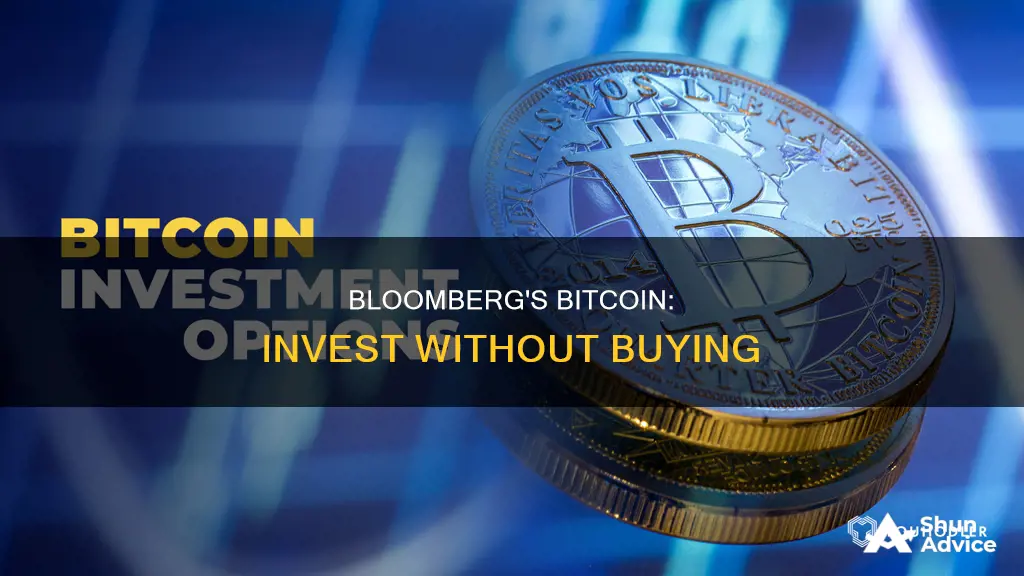
Bitcoin's volatile yet impressive performance over the years has sparked curiosity among investors. In 2021, the value of the world's largest cryptocurrency skyrocketed to almost $70,000, more than doubling its price in the same year. As a result, many are keen to explore ways to invest in Bitcoin without directly purchasing the digital coin.
| Characteristics | Values |
|---|---|
| Regulated derivatives products | Allow investors to gain exposure to bitcoin without dealing directly with crypto |
| Exchange-traded funds (ETFs) | Funds that hold a basket of stocks associated with Bitcoin |
| Trusts | Closed-end trusts like the Grayscale Bitcoin Trust represent shares in a publicly traded fund |
| Options | Grants the right to buy or sell bitcoin at a predetermined price within a certain time period |
| Futures | Allow investors to buy or sell bitcoin in the future at a price decided today |
| Perpetual swap contracts (perps) | Futures contracts that never expire, allowing investors to bet on bitcoin's price forever |
| Synthetic bitcoin | Tokens minted on another blockchain and pegged to bitcoin's price |
What You'll Learn

Exchange-traded funds (ETFs)
There are a few different types of Bitcoin ETFs that investors can consider, each offering its own unique advantages. One type is a physical Bitcoin ETF, which directly holds Bitcoin and aims to track the price of the digital currency. These ETFs provide investors with a secure way to invest in Bitcoin without the challenges of buying and storing it themselves. The ETF handles the security and storage of the underlying Bitcoin, providing peace of mind to investors.
Another type is a futures-based Bitcoin ETF. Instead of holding physical Bitcoin, these ETFs invest in futures contracts that are based on the price of Bitcoin. Futures contracts allow investors to speculate on the future price movements of Bitcoin without taking ownership of the asset. These ETFs can provide investors with indirect exposure to Bitcoin price changes and offer a way to diversify their portfolio.
When choosing a Bitcoin ETF, it's important to consider the fund's objectives, fees, and performance. Reputable ETFs are regulated and transparent, providing regular updates on their holdings and performance metrics. Investors should review the fund's prospectus to understand the investment strategy, risks, and potential costs associated with the ETF. It's also beneficial to examine the historical performance of the ETF, although past results do not guarantee future returns.
To invest in a Bitcoin ETF, you can follow these simple steps: First, open an account with a brokerage firm or investment platform that offers ETFs. Ensure the platform provides access to the specific Bitcoin ETF you wish to invest in. Then, fund your brokerage account using your preferred payment method, such as a bank transfer or credit card. Once the funds are available, you can place a buy order for the Bitcoin ETF, specifying the amount you wish to invest. The ETF will then be added to your portfolio, and you can monitor its performance over time.
Bitcoin Investors: Arrested for Their Crypto Investments?
You may want to see also

Bitcoin stocks and funds
There are several ways to gain exposure to Bitcoin's price without buying the cryptocurrency itself. Here are some options for investing in Bitcoin stocks and funds:
- Exchange-Traded Funds (ETFs): ETFs are investment funds that trade on stock exchanges and can hold various assets, including Bitcoin. ETFs offer investors a more regulated and protected way to invest in Bitcoin compared to buying the cryptocurrency directly. Examples of Bitcoin ETFs include the Grayscale Bitcoin Trust (GBTC), iShares Bitcoin Trust ETF (IBIT), and ProShares Bitcoin Strategy ETF (BITO).
- Closed-end funds or trusts: These are similar to ETFs but are not traded on an exchange. An example is the Grayscale Bitcoin Trust, which represents shares in a publicly traded fund.
- Bitcoin options and futures: Derivative products allow investors to trade claims on the price of Bitcoin rather than buying it outright. Bitcoin futures contracts, for instance, let you buy or sell Bitcoin in the future at a predetermined price. Bitcoin options give you the right to buy or sell Bitcoin at a specific price within a certain time frame.
- Investing in companies with Bitcoin exposure: Another way to gain exposure to Bitcoin's price is to invest in companies that hold or trade Bitcoin. For example, Coinbase, a popular crypto exchange, generates most of its revenue through trading fees, which tend to increase when Bitcoin is performing well. Other companies that hold Bitcoin in their portfolios include Tesla and MicroStrategy. Additionally, mining stocks like Hut 8 Mining and Riot Blockchain tend to rise and fall with Bitcoin's performance.
- Investing in Bitcoin mining infrastructure: Bitcoin relies on specialised mining hardware and cloud computing power. Therefore, investing in companies that create the necessary hardware and provide the required computing power can be a way to gain indirect exposure to Bitcoin.
It is important to note that investing in Bitcoin and related financial products carries significant risks, including volatility, fraud, and regulatory uncertainty. Investors should carefully consider their risk tolerance and conduct thorough research before investing.
Is Bitcoin a Safe Investment?
You may want to see also

Bitcoin mining companies
Some notable Bitcoin mining companies include:
- Hut 8 Mining
- Riot Blockchain
- Marathon Digital Holdings
- Bitdeer Technologies Group
- HIVE Blockchain Technologies
- GRIID Infrastructure
- Stronghold Digital Mining
- Gryphon Digital Mining
- BIT Mining (500.com)
- Greenidge Generation Holdings
- Bitfarms Ltd
- CleanSpark
By investing in these companies, you can indirectly benefit from the performance of Bitcoin without dealing with the complexities and risks associated with direct cryptocurrency investments.
Bitcoins: Safe Investment or Risky Gamble?
You may want to see also

Bitcoin futures
A futures contract is an agreement to buy or sell an asset, in this case, Bitcoin, at a specified price on a future date. They are typically traded on a futures exchange, such as the Chicago Mercantile Exchange (CME). The CME offers Micro Bitcoin futures, which are contracts that are 1/10 the size of one bitcoin, allowing for more precise risk management.
With a Bitcoin futures contract, you can take a long position if you expect the price of Bitcoin to rise, or a short position if you expect it to fall. This allows traders to speculate on the future price of Bitcoin and make quick profits. For example, if you expect the price of Bitcoin to increase, you can enter into a futures contract to buy Bitcoin at a specified price on a future date. If the price of Bitcoin is higher than the specified price on that date, you can buy it at the lower, specified price and then sell it at the higher market price, profiting from the difference.
Additionally, Bitcoin futures provide the benefit of leverage, allowing you to magnify relatively small price movements and create more significant profits. They are also highly liquid, with trillions in monthly volume, reducing the risk of trading in these markets.
Overall, Bitcoin futures offer a way to gain exposure to Bitcoin and its price movements without having to deal directly with the underlying cryptocurrency. They provide flexibility, protection against volatility, and the potential for significant profits through leverage.
The Future of Crypto.com Coin: Is It Worth Investing?
You may want to see also

Blockchain technology companies
Blockchain technology has been around for about a decade, but its real-world implementation is still in its early days. Blockchain is a form of ledger technology (also known as distributed ledger technology) that keeps records in a decentralised manner. This technology has many applications beyond just cryptocurrency, including loyalty programs, copyright protection, and real estate transfers.
- Nvidia (NVDA): The leading manufacturer of graphics processing units (GPUs), which are essential components in AI, autonomous vehicles, and gaming. GPUs are also key hardware for cryptocurrency mining.
- Block (SQ): Formerly known as Square, this fintech company has two main components to its business: a payment-processing ecosystem for small businesses and a personal financial platform called Cash App, which allows users to buy and sell Bitcoin. Block also has its own team of Bitcoin developers and an open-developer platform for blockchain applications.
- IBM (IBM): IBM has helped more than 220 businesses develop applications and data governance tools that run on blockchain. The company recently acquired Red Hat, providing cross-selling opportunities with its enterprise clients.
- Mastercard (MA): This payment processing giant has recognised the potential of blockchain to transform the cashless payment space, especially for cross-border money transfers. Mastercard has partnered with several blockchain technology companies and launched a Crypto Card partner program.
- Amazon (AMZN): Amazon Web Services (AWS) offers Amazon Managed Blockchain, allowing customers to create and manage their blockchain networks. Amazon also has the potential to incorporate blockchain into its e-commerce business.
- Coinbase (COIN): The world's largest cryptocurrency exchange, with over 100 different digital assets available to trade and roughly 98 million users worldwide. Coinbase has taken a hit with the recent decline in cryptocurrency prices but could benefit if the market rebounds.
- GlobalX Blockchain ETF (BKCH): This exchange-traded fund (ETF) provides investors with exposure to a basket of blockchain stocks with a single investment, including Coinbase, which is the fund's top holding.
Other notable blockchain technology companies include:
- Ava Labs: Operates the Avalanche blockchain platform, which enables developers to launch customised public and private blockchains at a low cost.
- Chainlink: A Web3 services platform that makes it easy for developers to build their own Web3 applications, connecting real-world data and computation with blockchains.
- ConsenSys: A company focused on decentralised finance solutions and Ethereum software, offering products like Quorum, Infura, and Codefi.
- Blockdaemon: An independent blockchain infrastructure platform that allows users to make transactions, stake, and earn cryptocurrency via nodes and within one interface.
- Chronicled: Leverages blockchain-enabled IoT devices to create a more transparent supply chain, helping industries like pharmaceuticals and precious metals track their shipments.
- Ripple: A payment network using blockchain to transfer money globally, with international financial institutions like American Express and BBVA using its platform to send payments securely.
- Mythical Games: A studio creating games and online experiences that feature true ownership of digital assets, with a blockchain-based game called Blankos released in 2020.
- Robinhood: A stock brokerage app that lets users buy and sell stocks, ETFs, and cryptocurrency, including Bitcoin and Litecoin.
- Circle: An online money transfer and cryptocurrency investment platform that also offers investment opportunities in NFT platforms, crypto gaming, and institutional traders.
- Spring Labs: Enables faster and more secure information transfer between businesses by leveraging blockchain's transparency and real-time data ledger technology.
- Autograph: An NFT platform that facilitates brands and names in sports, entertainment, and culture, providing customers with exclusive experiences and merchandise.
These companies are leading the way in the development and application of blockchain technology, and their success could shape the future of this exciting field.
Smart Strategies to Invest in Bitcoin: 40X Profits
You may want to see also
Frequently asked questions
There are several ways to invest in Bitcoin without buying it directly. One way is to invest in Bitcoin stocks and funds. Several publicly traded companies have invested in Bitcoin or are involved in the cryptocurrency industry.
Examples of companies that have invested in Bitcoin include MicroStrategy, Square, and Tesla.
Yes, another way is to invest in Bitcoin mining companies. These companies are responsible for validating transactions and adding them to the blockchain, making the process easier.
Yes, investing in Bitcoin mining companies can be risky due to the fluctuating nature of Bitcoin's value and the energy-intensive process of mining.
Bitcoin derivatives are financial instruments that allow investors to bet on the future price of Bitcoin without owning any. Derivatives include options, futures, and swaps.







